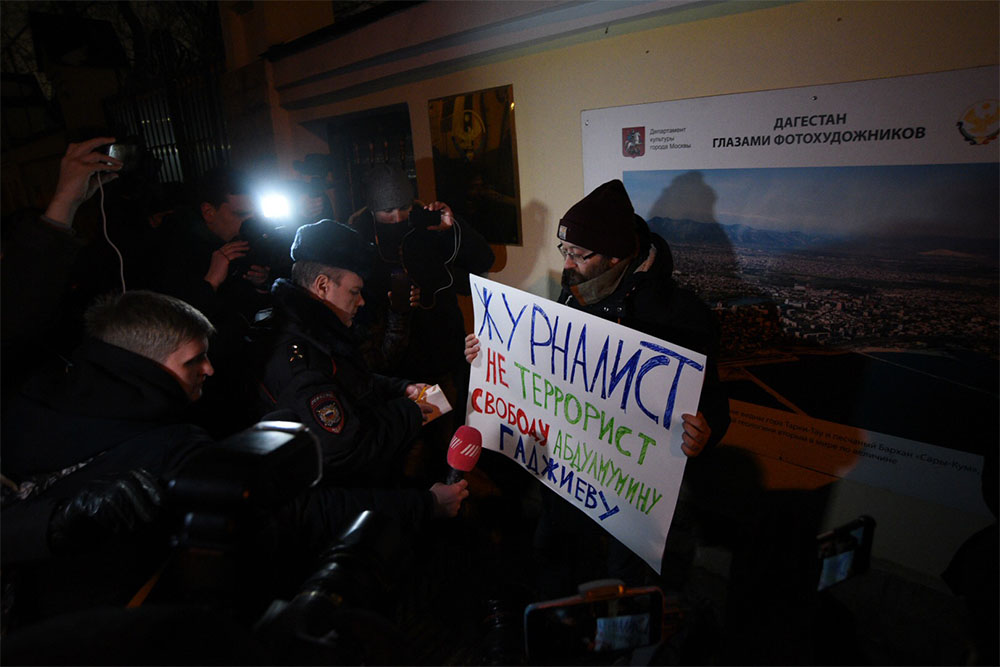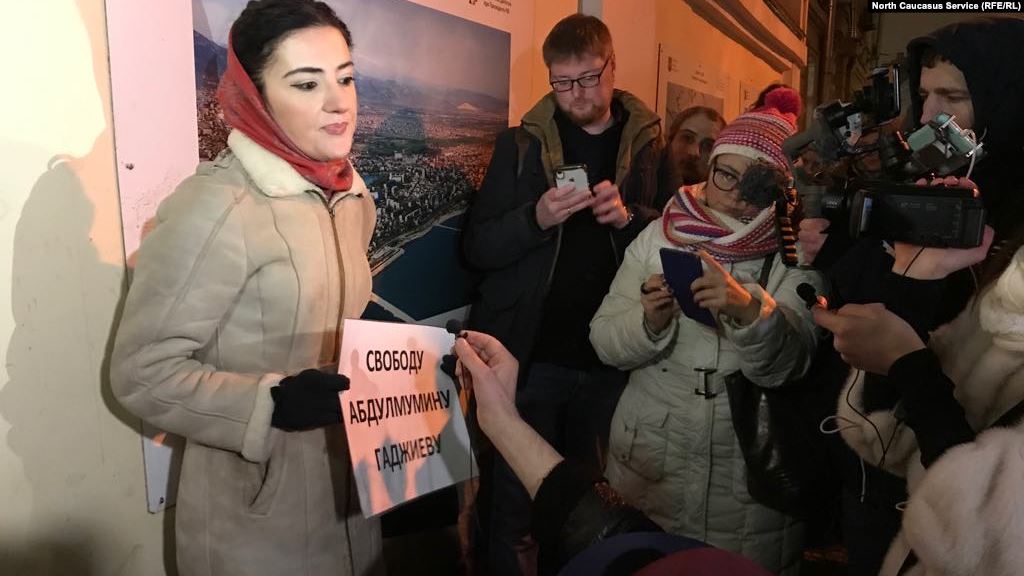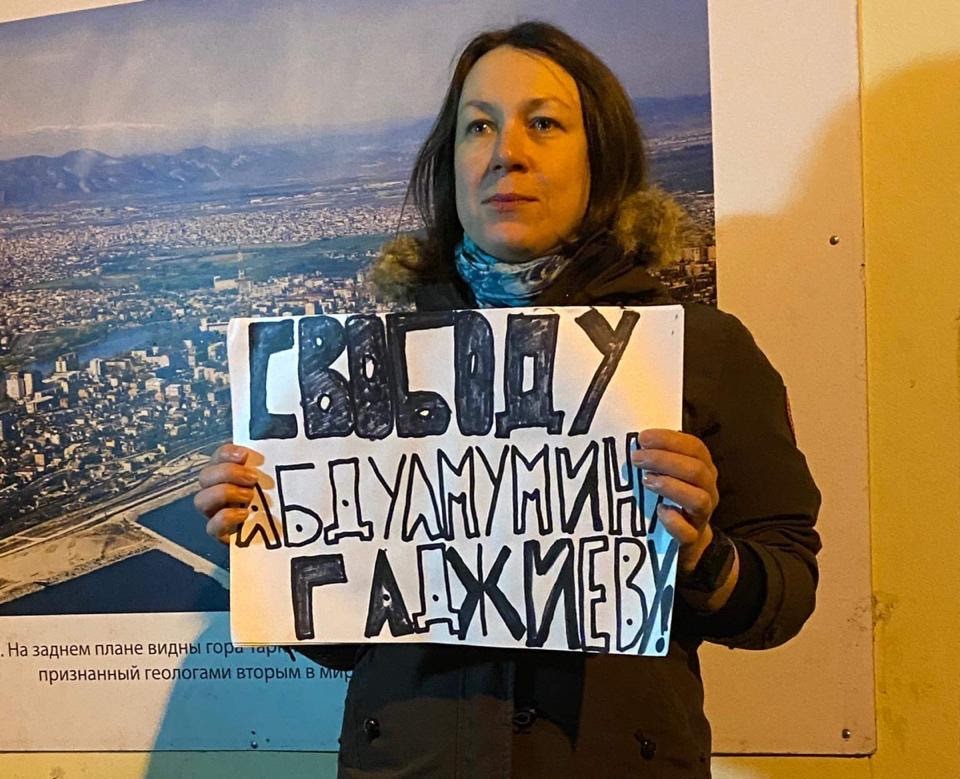

A number of prominent Russian journalists have called for the release of Abdulmumin Gadzhiyev, a columnist and editor from Daghestani newspaper Chernovik, prompting single-person pickets in Moscow in his support.
Over 100 journalists and supporters held single-person pickets outside the Daghestani Government’s office in Moscow on 29 January calling for Gadzhiyev’s release and for the head of Daghestan, Vladimir Vasiliyev, to weigh in on the situation.
Gadzhiyev, a columnist and editor at Daghestani newspaper Chernovik, was arrested last June on terror charges.
The protest came after 16 prominent journalists from Novaya Gazeta, Meduza, Channel One Kommersant, Radio Liberty, Znak.com, Mediazona, and others released a video address on 27 January demanding Gadzhiyev’s release.
[Read more on OC Media: Editor and journalist from Daghestani newspaper Chernovik detained on terror charges]
Chernovik’s owner, Magdi Kamalov, who was present at 29 January’s protest, told OC Media that journalists from Novaya Gazeta, MBKh Media, TV Rain, Ekho Moskvy, and Mediazona took part in the pickets. He said that relatives of another of the detainees in Gadzhiyev’s case, Moscow businessperson Kemal Tambiyev, also took part.
Activists from Russian rights group Memorial and Amnesty International also attended.
According to Kamalov, the purpose of the picket was to attract national attention to the case. He said colleagues from national media outlets had for some time been studying Gadzhiyev’s case before speaking collectively in his support.

Ilya Azar, one of the organisers of the protest and a journalist at Novaya Gazeta, was the first in line to stand in the single-person picket.
Azar told OC Media that support from national media would yield results as Gadzhiyev’s story was currently little known outside of Daghestan.
‘And the [reason for] the silence of the head of Daghestan, Vladimir Vasiliyev, remains incomprehensible’, he said.
Single-person pickets, where one person holds a protest placard at a time with protesters often rotating, are a common form of protest in Russia, where larger demonstrations require the permission of the authorities.
[Read more about Gadzhiyev’s case on OC Media: Daghestani authorities refuse 64th request for protest permit in support of imprisoned journalist]
‘Freedom to Abdulmumin Gadzhiyev’
The video address that sparked the protest was published simultaneously on 27 January on the websites of at least 16 Russian media outlets, including Radio Liberty, Grani.ru, Kommersant, Rosbalt, Snob, and Novaya Gazeta.
In it, the journalists demanded the termination of the ‘absurd’ criminal case against Gadzhiyev.
Irina Shikhman, who hosts YouTube project A Pogovorit?, said it was unacceptable to accuse a journalist of financing terrorism ‘only because he once interviewed a person who was later accused of terrorism’.
‘I believe that the evidence presented in this case […] certainly shows that this case is fabricated’, Tatyana Felgenhauer, Deputy Editor-in-chief of Ekho Moskvy said.
‘This is a completely illogical and delusional accusation based on which a person is facing the prospect of a life sentence’, Alexander Sokolov, a correspondent newspaper Vedomosti said. Sokolov was himself convicted of organising an extremist community and spent two years in pre-trial detention before being released due to time served.
‘Journalists, civic activists, human rights activists working in the regions are in the most vulnerable position, especially when it comes to the North Caucasus’, Ivan Kolpakov, the Editor-in-chief of Meduza said.
Novaya Gazeta journalist Irina Gordiyenko said that ‘for Daghestan, the accusation of financing terrorism is tantamount to planting drugs on [an ethnically Russian journalist] somewhere in Moscow, Barnaul or Novosibirsk’.

Soon after the video was released, the OSCE representative on Media Freedom, Harlem Désir, called for Gadzhiyev’s release on Twitter.
‘I am worried by the extension of arrest of Abdulmumin Gadzhiev from Chernovik portal in Dagestan Russia on terrorism charges. Gadzhiev is a journalist. He should not be prosecuted for his professional activities. I call for drop of charges against him and for his release’, Désir tweeted.
I am worried by the extension of arrest of Abdulmumin Gadzhiev from #Chernovik portal in #Dagestan #Russia on terrorism charges. Gadzhiev is a journalist. He should not be prosecuted for his professional activities. I call for drop of charges against him and for his release.
— OSCE media freedom (@OSCE_RFoM) January 27, 2020
The authorities’ reaction
On 27 January, Russian MP Sergey Shargunov sent an official letter to the Prosecutor General of Russia, Igor Krasnov, asking that his office take over control of Gadzhiyev’s case.
Shargunov wrote that the only evidence against Gadzhiyev was testimony from another suspect in the case which was obtained through torture.
The letter said that Gadzhiyev considered his criminal prosecution illegal and had linked it with attempts to hinder his journalism.
He called on the Prosecutor General to verify the legal grounds of the actions of the investigating authorities.
Dmitry Peskov, the press secretary of Russian President Vladimir Putin, reacted by saying on 28 January that he was aware of appeal by journalists but that the President’s Administration was not familiar with the details of the case.
‘We saw media reports about this […] We don’t know what is the basis of the allegations that some testimony was obtained under torture, we don’t know how much they correspond to reality’, said Peskov.
He insisted that the Prosecutor General’s office would verify the legality of Gadzhiyev’s prosecution.
Abdulmumin Gadzhiyev’s case
Abdulmumin Gadzhiyev was arrested on 14 June 2017 on charges of financing terrorism and participating in a terrorist organisation. Moscow businessperson Kemal Tambiyev and co-founder of the Ansar charity fund, Abubakar Rizvanov, were arrested on the same grounds.
Gadzhiyev was initially accused of ‘financing terrorism through a conspiratorial group in VKontakte called Abdulmumin Gadzhiyev’. The evidence for this was testimony from Kemal Tambiyev, who said during his own bail hearing on 16 June that he signed this testimony under the influence of torture.
On 22 July, Gadzhiyev was officially charged but instead of ‘financing terrorism’, the authorities now accused him of joining Chernovik in order to write about a charity run by Abu Umar Sasitlinskiy.
Sasitlinskiy has been on an international wanted list since 2018 accused of ‘financing terrorism and participation in a terrorist organisation’.
On 3 October, police raided the editorial office of Chernovik, and confiscated equipment and journalists’ notes.
[Read more on OC Media: Russian authorities raid offices of Daghestan’s Chernovik newspaper]
In the beginning of December, Gadzhiyev filed a complaint with the European Court of Human Rights (ECHR) over his detention.
On 31 December, Makhachkala’s Sovietsky District Court extended the pre-trial detention of Gadzhiyev and Rizvanov until 13 March. The Supreme Court of Daghestan upheld this decision on 27 January.









